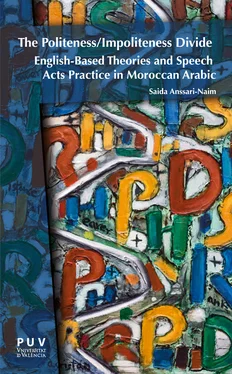In this study my intention is to explore the particular contribution of Moroccan Arabic (MA), and the cultural code associated with it, to the theoretical discourse on politeness. My focus will be on the particular way MA handles central speech acts such as expressing gratitude, invitations and compliments. However, as I will try to show, the ‘unique’ treatment of these speech acts uncovers a new way of viewing the act of communicating and of understanding how human beings are involved in this process. To my understanding, politeness is more than a mere strategy to solve the conflicts inherent to social interactions; it is a way of constructing our identity, and the identities of others, in human terms. The issue of how MA deals with certain speech acts leads us, somehow, to rethink the disciplinary adscription of the theoretical discourse on politeness, removing it from an interactional sociolinguistics frame, where it was initially formulated, into the domain of linguistic anthropology, or, simply anthropology.
The dialogue between a theoretical discourse and the empirical field which this discourse describes is articulated here in two stages. In the first, an intercultural contrast (a theory originally based on English and Anglo-Saxon culture sets against empirical data from MA) allows us to identify specific cases of what concerns a polite behaviour. It is precisely this contrast with the theoretical discourse that leads us to pay a special attention to the aspects of a polite behaviour in MA that might not have been seen as meriting explicit reflection had they not been questioned from outside the culture. Indeed, the contact and contrast with other cultural contours is the only instrument at our disposal to identify singularities of the culture itself. In the second stage, these singularities are re-examined and through this they cease to be loose and discordant pieces of the theoretical discourse, inasmuch as their inherent internal logic now becomes apparent. In this way, the empirical field described becomes a true interlocutor with the theoretical discourse, which must adapt the assumptions and the scope of its proposals if the aim of a universal description is to be achieved. Politeness is definitely a universal phenomenon, so to think about politeness requires a dialogue between complementary visions adopting a transcultural position.
To conclude this brief introduction, it is worth mentioning that the formulation of this type of theory is fed by my personal bicultural experiences, as a person for whom the forging of a style and an identity was the result of a long process of hybridization and reconciliation of cultural codes, a process, of course, which included problems and more than one misunderstanding. Intercultural dialogue has been in my case an inner dialogue, one that people in such circumstances normally keep to themselves.
Through my experience as a native speaker of MA and also my work in the field of pragmatics, I was able to anticipate that the use of the three speech acts chosen for the present study might involve potential pragmatic conflicts in terms of Western communicative expectations. Communicative breakdowns or other problems are thus expected to occur during interactions between Moroccans and, for example, English speakers as a result of the lack of a one-to-one correspondence of how thanks/apologies, invitations and compliments are used and interpreted in the two language communities.
An overview of the sociolinguistic profile of Morocco will now be given, together with a description of the different dialects spoken in this country.
 2
2 
A sociolinguistic profile of Morocco
Morocco’s strategic situation at the cross road between Africa and Europe and its recent history of colonization is the dominant source for the Moroccan rich ethno-linguistic patrimoine. Though the original language was Berber and its varieties, today, Moroccan Arabic is the mother tongue of most Moroccans. Most accounts describe Morocco as a multilingual community where the majority of Moroccans speak at least two of the five co-existing languages 1 , namely, Berber, Moroccan Arabic (MA), Classical Arabic (CA), French and Spanish. Berber is the language of the aboriginals of Morocco and of all Northern Africa as well, and the first contact of Moroccans with CA was through the conquest by the Arabs from the east in the 7 thcentury A.D, and through the process of conversion to Islam. CA is today the official language of all Arab countries and it is used in press, in politic activities, in religious ceremonies and in educational programs. CA is the symbol of unity of all Arab countries and a highly esteemed language by Arabs especially Muslims who consider it as sacred for being the language of the Koran, ‘the eternal word of God’ as well as ‘a transcript of our eternal book, sublime and full of wisdom’(Dawood 1975, cit. in Gravel 1979: 83). As a natural evolution of CA, we find Modern Standard Arabic (MSA), which is used today in all Arab countries as a manifestation of progress and adaptation to the modern world where the coinage and use of technical and scientific terms is a mus t. To express this in terms of Youssi (1977), MSA is the language of argumentation and vulgarization of ideas pertaining to politics, science, medicine, technical procedures, theatre and sport. MSA is exclusively spoken by educated people and in the mass media. MSA shares the same syntax and morphology with CA though they differ with respect to lexis.
Within this process of invasion of the Arabic language and its consequent establishment (to the cost of Berber) as the official language of Morocco, we arrive at the process of colonization of Morocco by both France and Spain. The French settlers used the French language as a policy of expansion meant to annex and gain ground over the Moroccan culture and language. French was introduced and inculcated to Moroccans as the language of civilization and progress, and as such it became the language of instruction at different levels of educational programs from the primary to university levels. All this has guaranteed the diffusion of the French language and has created a prosperous climate for the emergence of a large elite completely assimilated into the French culture and reaching a native-like proficiency in French. Meanwhile, Arabic was reduced to a language taught in Coranic schools known as “M’sid” 2 , which are neither public nor private, and normally situated in/or in the proximities of Mosques and usually run with collective funds and donations, but not by the state. These schools were the only institution where children could learn the Arabic language, and as a secondary level they could go to “M’dersas” 3 , and those who wanted to continue their studies, they were admitted to the University of Karaouiyine in Fes.
The impact of the French linguistic invasion is still obvious in the speech behaviour of Moroccans even after independence was achieved. Despite the government attempts of Arabization of the school and the administration, Moroccans still use French or a kind of “Russian salad” language, where French and Arabic are intermingled. This sociolinguistic phenomenon has been the central focus of many studies as a good example of code switching. Right now, French is still used in Moroccan administration so the government is attempting to replace it with Arabic. Nevertheless, the process of Arabization seems to be slow and is a long way from being achieved. However, in the present, French is solely taught as a foreign language and there appears to be a reluctant detachment from the aftermath of the French linguistic and cultural colonialism.
Читать дальше

 2
2 









